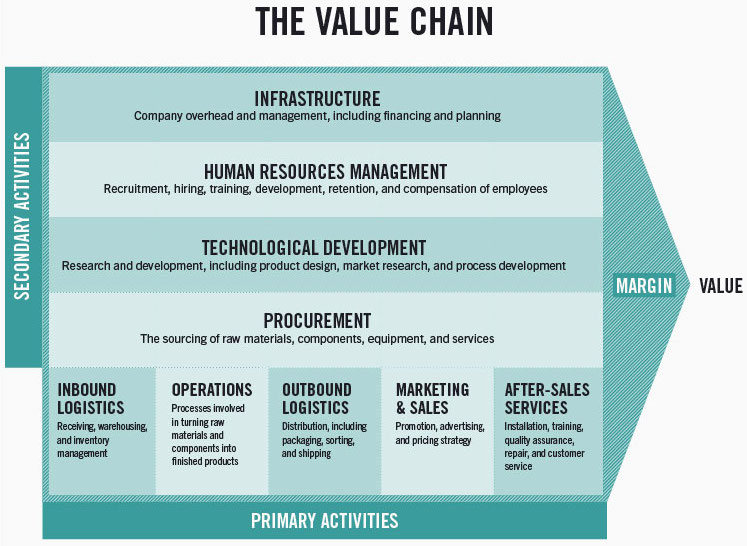Ahmedabad
(Head Office)Address : 506, 3rd EYE THREE (III), Opp. Induben Khakhrawala, Girish Cold Drink Cross Road, CG Road, Navrangpura, Ahmedabad, 380009.
Mobile : 8469231587 / 9586028957
Telephone : 079-40098991
E-mail: dics.upsc@gmail.com

Integrating MSMEs into Global Value Chains
The rapidly expanding Global Value Chains (GVCs) of multinational corporations (MNCs) are increasingly dominating international trade, which emerging economies like India can hardly afford to ignore. The limited presence of Indian micro, small and medium enterprises (MSMEs) in the GVCs is a consequence of the negligible share of internationalised MSMEs, which is primarily due to a weak innovation base, owing to weak networks of MSMEs.
What are Global Value Chains?
• Global Value Chains (GVCs) refer to international production sharing, a phenomenon where production is broken into activities and tasks carried out in different countries.
• In recent decades, international trade is increasingly dominated by global value chains (GVCs) of multinational corporations (MNCs). More than two-thirds of international trade now takes place within such GVCs.
• Internationalisation led by the steadily expanding GVCs has been rapidly reshaping the competitive environment of business in the global economy.
How does integration of MSMEs help in the GVC?
Employment Generation
• According to World Bank’s World Development Report 2020, GVC’s can help reduce poverty, and help augment growth and employment. However, it is possible only with reforms in developing countries and policy continuity in industrial economies.
• The Economic Survey of India also highlighted that by participating in GVCs, India’s manufacturing sector may witness an addition of four million jobs by 2025 thus contributing one-fourth of the total in value-added terms towards the $5 trillion economy.
Productivity improvements
• GVC firms engaged in manufacturing activities show higher labor productivity than one-way traders or non-traders, after controlling for firm-level capital intensity.
Boosts Income
• Cross-country estimates suggest that a 1% increase in GVC participation can boost per-capita income by more than 1%, particularly when countries engage in limited and advanced manufacturing.
• OECD’s Metro Model shows that localized regimes are more vulnerable to shocks, and therefore result in a significantly lower level of economic activity and fall in national incomes as compared to the interconnected regimes.
Factors that restrict GVC integration
• MSMEs’ integration into GVCs depends crucially on access to finance, however, the credit supply shortage to MSMEs has been a concerning gap in India’s MSME sector.
• Lack of working capital often disturbs MSME’s day to day operations.
• Given that 95% of the MSMEs in India are in the informal sector, access to formal finance remains a significant constraint. Studies highlight that MSMEs as a whole receive less than 6% of bank credit.
• MSMEs are averse to adopting digital solutions due to lack of understanding and limited training.
• The number of applications filed by MSMEs on the delayed payment monitoring system MSME Samadhan has crossed the 1-lakh mark, amounting to over ₹26,000 crore.
What steps can be taken to integrate MSME’s into GVC?
• A recent MSME digital readiness survey by PayPal highlighted that 29% of the MSMEs witnessed an increase in online customers and 32% experienced better payment solutions. The digital payment ecosystem holds immense potential for MSMEs by helping them expand their online customer base and enabling faster flow of funds.
• Banks can play the role of facilitator by helping arrange networking sessions with global companies.
• It becomes essential to provide training and generate more awareness among MSMEs about digitalisation of banking systems and their operational dynamics to make the digital transformation smoother. Moreover, a strong impetus towards greater digitalisation in finance is the need of the hour
• To integrate MSME’s with GVC it becomes imperative to have reforms in the labour markets, trade infrastructure and improving overall business environment.

Address : 506, 3rd EYE THREE (III), Opp. Induben Khakhrawala, Girish Cold Drink Cross Road, CG Road, Navrangpura, Ahmedabad, 380009.
Mobile : 8469231587 / 9586028957
Telephone : 079-40098991
E-mail: dics.upsc@gmail.com
Address: A-306, The Landmark, Urjanagar-1, Opp. Spicy Street, Kudasan – Por Road, Kudasan, Gandhinagar – 382421
Mobile : 9723832444 / 9723932444
E-mail: dics.gnagar@gmail.com
Address: 2nd Floor, 9 Shivali Society, L&T Circle, opp. Ratri Bazar, Karelibaugh, Vadodara, 390018
Mobile : 9725692037 / 9725692054
E-mail: dics.vadodara@gmail.com
Address: 403, Raj Victoria, Opp. Pal Walkway, Near Galaxy Circle, Pal, Surat-394510
Mobile : 8401031583 / 8401031587
E-mail: dics.surat@gmail.com
Address: 303,305 K 158 Complex Above Magson, Sindhubhavan Road Ahmedabad-380059
Mobile : 9974751177 / 8469231587
E-mail: dicssbr@gmail.com
Address: 57/17, 2nd Floor, Old Rajinder Nagar Market, Bada Bazaar Marg, Delhi-60
Mobile : 9104830862 / 9104830865
E-mail: dics.newdelhi@gmail.com